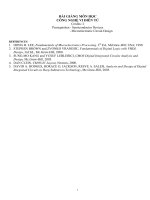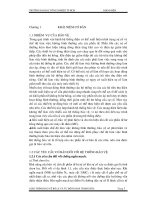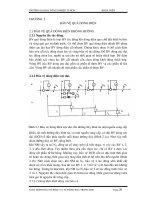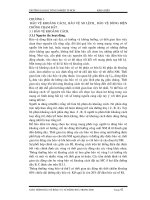LM555 LM555C Timer Datasheet.PDF
Bạn đang xem bản rút gọn của tài liệu. Xem và tải ngay bản đầy đủ của tài liệu tại đây (236.08 KB, 11 trang )
LM555/LM555C Timer
General Description
The LM555 is a highly stable device for generating accurate
time delays or oscillation. Additional terminals are provided
for triggering or resetting if desired. In the time delay mode
of operation, the time is precisely controlled by one external
resistor and capacitor. For astable operation as an oscillator, the free running frequency and duty cycle are accurately
controlled with two external resistors and one capacitor.
The circuit may be triggered and reset on falling waveforms,
and the output circuit can source or sink up to 200 mA or
drive TTL circuits.
Y
Y
Y
Y
Y
Applications
Y
Y
Y
Features
Y
Y
Y
Y
Direct replacement for SE555/NE555
Timing from microseconds through hours
Operates in both astable and monostable modes
Adjustable duty cycle
Output can source or sink 200 mA
Output and supply TTL compatible
Temperature stability better than 0.005% per § C
Normally on and normally off output
Y
Y
Y
Precision timing
Pulse generation
Sequential timing
Time delay generation
Pulse width modulation
Pulse position modulation
Linear ramp generator
Schematic Diagram
TL/H/7851 – 1
C1995 National Semiconductor Corporation
TL/H/7851
RRD-B30M115/Printed in U. S. A.
LM555/LM555C Timer
February 1995
Absolute Maximum Ratings
Storage Temperature Range
If Military/Aerospace specified devices are required,
please contact the National Semiconductor Sales
Office/Distributors for availability and specifications.
Supply Voltage
Power Dissipation (Note 1)
LM555H, LM555CH
LM555, LM555CN
Operating Temperature Ranges
LM555C
LM555
b 65§ C to a 150§ C
Soldering Information
Dual-In-Line Package
Soldering (10 Seconds)
Small Outline Package
Vapor Phase (60 Seconds)
Infrared (15 Seconds)
a 18V
760 mW
1180 mW
260§ C
215§ C
220§ C
See AN-450 ‘‘Surface Mounting Methods and Their Effect
on Product Reliability’’ for other methods of soldering surface mount devices.
0§ C to a 70§ C
b 55§ C to a 125§ C
Electrical Characteristics (TA e 25§ C, VCC e a 5V to a 15V, unless othewise specified)
Limits
Parameter
Conditions
LM555
Min
Supply Voltage
Supply Current
Timing Error, Monostable
Initial Accuracy
Drift with Temperature
4.5
VCC e 5V, RL e %
VCC e 15V, RL e %
(Low State) (Note 2)
3
10
RA e 1k to 100 kX,
C e 0.1 mF, (Note 3)
Accuracy over Temperature
Drift with Supply
Timing Error, Astable
Initial Accuracy
Drift with Temperature
RA, RB e 1k to 100 kX,
C e 0.1 mF, (Note 3)
Accuracy over Temperature
Drift with Supply
Threshold Voltage
Trigger Voltage
LM555C
Max
Min
18
4.5
5
12
4.8
1.45
Reset Voltage
0.4
Reset Current
Threshold Current
(Note 4)
Control Voltage Level
VCC e 15V
VCC e 5V
9.6
2.9
Pin 7 Leakage Output High
VCC e 15V, I7 e 15 mA
VCC e 4.5V, I7 e 4.5 mA
2
Typ
3
10
Units
Max
16
V
6
15
mA
mA
0.5
30
1
50
%
ppm/§ C
1.5
0.05
1.5
0.1
%
%/V
1.5
90
2.25
150
%
ppm/§ C
2.5
0.15
3.0
0.30
%
%/V
0.667
x VCC
5
1.67
V
V
0.667
VCC e 15V
VCC e 5V
Trigger Current
Pin 7 Sat (Note 5)
Output Low
Output Low
Typ
5
1.67
5.2
1.9
0.01
0.5
0.5
1
0.1
0.4
0.4
0.5
0.9
0.5
1
V
0.1
0.4
mA
0.1
0.25
mA
10
3.33
11
4
V
V
mA
0.1
0.25
10
3.33
10.4
3.8
1
100
1
100
nA
150
70
100
180
80
200
mV
mV
9
2.6
Electrical Characteristics TA e 25§ C, VCC e a 5V to a 15V, (unless othewise specified) (Continued)
Limits
Parameter
Conditions
LM555
Min
Output Voltage Drop (Low)
Output Voltage Drop (High)
Max
0.1
0.4
2
2.5
0.15
0.5
2.2
0.1
0.25
VCC e 15V
ISINK e 10 mA
ISINK e 50 mA
ISINK e 100 mA
ISINK e 200 mA
VCC e 5V
ISINK e 8 mA
ISINK e 5 mA
ISOURCE e 200 mA, VCC e 15V
ISOURCE e 100 mA, VCC e 15V
VCC e 5V
13
3
LM555C
Typ
12.5
13.3
3.3
Min
12.75
2.75
Units
Typ
Max
0.1
0.4
2
2.5
0.25
0.75
2.5
0.25
0.35
V
V
V
V
V
V
12.5
13.3
3.3
V
V
V
Rise Time of Output
100
100
ns
Fall Time of Output
100
100
ns
Note 1: For operating at elevated temperatures the device must be derated above 25§ C based on a a 150§ C maximum junction temperature and a thermal
resistance of 164§ c/w (T0-5), 106§ c/w (DIP) and 170§ c/w (S0-8) junction to ambient.
Note 2: Supply current when output high typically 1 mA less at VCC e 5V.
Note 3: Tested at VCC e 5V and VCC e 15V.
Note 4: This will determine the maximum value of RA a RB for 15V operation. The maximum total (RA a RB) is 20 MX.
Note 5: No protection against excessive pin 7 current is necessary providing the package dissipation rating will not be exceeded.
Note 6: Refer to RETS555X drawing of military LM555H and LM555J versions for specifications.
Connection Diagrams
Dual-In-Line and Small Outline Packages
Metal Can Package
TL/H/7851 – 2
Top View
TL/H/7851 – 3
Order Number LM555H or LM555CH
See NS Package Number H08C
Top View
Order Number LM555J, LM555CJ,
LM555CM or LM555CN
See NS Package Number J08A, M08A or N08E
3
Typical Performance Characteristics
Minimuim Pulse Width
Required for Triggering
Supply Current vs
Supply Voltage
High Output Voltage vs
Output Source Current
Low Output Voltage vs
Output Sink Current
Low Output Voltage vs
Output Sink Current
Low Output Voltage vs
Output Sink Current
Output Propagation Delay vs
Voltage Level of Trigger Pulse
Output Propagation Delay vs
Voltage Level of Trigger Pulse
Discharge Transistor (Pin 7)
Voltage vs Sink Current
Discharge Transistor (Pin 7)
Voltage vs Sink Current
TL/H/7851 – 4
4
Applications Information
When the reset function is not in use, it is recommended
that it be connected to VCC to avoid any possibility of false
triggering.
MONOSTABLE OPERATION
In this mode of operation, the timer functions as a one-shot
(Figure 1 ). The external capacitor is initially held discharged
by a transistor inside the timer. Upon application of a negative trigger pulse of less than 1/3 VCC to pin 2, the flip-flop is
set which both releases the short circuit across the capacitor and drives the output high.
Figure 3 is a nomograph for easy determination of R, C
values for various time delays.
NOTE: In monostable operation, the trigger should be driven high before the end of timing cycle.
TL/H/7851 – 7
TL/H/7851 – 5
FIGURE 3. Time Delay
FIGURE 1. Monostable
The voltage across the capacitor then increases exponentially for a period of t e 1.1 RA C, at the end of which time
the voltage equals 2/3 VCC. The comparator then resets
the flip-flop which in turn discharges the capacitor and
drives the output to its low state. Figure 2 shows the waveforms generated in this mode of operation. Since the charge
and the threshold level of the comparator are both directly
proportional to supply voltage, the timing internal is independent of supply.
VCC e 5V
TIME e 0.1 ms/DIV.
RA e 9.1 kX
C e 0.01 mF
ASTABLE OPERATION
If the circuit is connected as shown in Figure 4 (pins 2 and 6
connected) it will trigger itself and free run as a multivibrator.
The external capacitor charges through RA a RB and discharges through RB. Thus the duty cycle may be precisely
set by the ratio of these two resistors.
TL/H/7851 – 6
Top Trace: Input 5V/Div.
Middle Trace: Output 5V/Div.
Bottom Trace: Capacitor Voltage 2V/Div.
TL/H/7851 – 8
FIGURE 2. Monostable Waveforms
During the timing cycle when the output is high, the further
application of a trigger pulse will not effect the circuit so
long as the trigger input is returned high at least 10 ms before the end of the timing interval. However the circuit can
be reset during this time by the application of a negative
pulse to the reset terminal (pin 4). The output will then remain in the low state until a trigger pulse is again applied.
FIGURE 4. Astable
In this mode of operation, the capacitor charges and discharges between 1/3 VCC and 2/3 VCC. As in the triggered
mode, the charge and discharge times, and therefore the
frequency are independent of the supply voltage.
5
Applications Information (Continued)
Figure 5 shows the waveforms generated in this mode of
operation.
TL/H/7851 – 11
VCC e 5V
Top Trace: Input 4V/Div.
TIME e 20 ms/DIV. Middle Trace: Output 2V/Div.
Bottom Trace: Capacitor 2V/Div.
RA e 9.1 kX
C e 0.01 mF
TL/H/7851–9
VCC e 5V
TIME e 20 ms/DIV.
RA e 3.9 kX
RB e 3 kX
C e 0.01 mF
Top Trace: Output 5V/Div.
Bottom Trace: Capacitor Voltage 1V/Div.
FIGURE 7. Frequency Divider
PULSE WIDTH MODULATOR
When the timer is connected in the monostable mode and
triggered with a continuous pulse train, the output pulse
width can be modulated by a signal applied to pin 5. Figure
8 shows the circuit, and in Figure 9 are some waveform
examples.
FIGURE 5. Astable Waveforms
The charge time (output high) is given by:
t1 e 0.693 (RA a RB) C
And the discharge time (output low) by:
t2 e 0.693 (RB) C
Thus the total period is:
T e t1 a t2 e 0.693 (RA a 2RB) C
The frequency of oscillation is:
1
1.44
fe e
T
(RA a 2 RB) C
Figure 6 may be used for quick determination of these RC
values.
The duty cycle is:
De
RB
RA a 2RB
TL/H/7851 – 12
FIGURE 8. Pulse Width Modulator
TL/H/7851–10
FIGURE 6. Free Running Frequency
TL/H/7851 – 13
FREQUENCY DIVIDER
The monostable circuit of Figure 1 can be used as a frequency divider by adjusting the length of the timing cycle.
Figure 7 shows the waveforms generated in a divide by
three circuit.
VCC e 5V
TIME e 0.2 ms/DIV.
RA e 9.1 kX
C e 0.01 mF
Top Trace: Modulation 1V/Div.
Bottom Trace: Output Voltage 2V/Div.
FIGURE 9. Pulse Width Modulator
PULSE POSITION MODULATOR
This application uses the timer connected for astable operation, as in Figure 10, with a modulating signal again applied
to the control voltage terminal. The pulse position varies
with the modulating signal, since the threshold voltage and
hence the time delay is varied. Figure 11 shows the waveforms generated for a triangle wave modulation signal.
6
Applications Information (Continued)
TL/H/7851 – 16
TL/H/7851 – 14
FIGURE 12
Figure 13 shows waveforms generated by the linear ramp.
The time interval is given by:
2/3 VCC RE (R1 a R2) C
Te
R1 VCC b VBE (R1 a R2)
VBE j 0.6V
FIGURE 10. Pulse Position Modulator
TL/H/7851 – 15
VCC e 5V
TIME e 0.1 ms/DIV.
RA e 3.9 kX
RB e 3 kX
C e 0.01 mF
Top Trace: Modulation Input 1V/Div.
Bottom Trace: Output 2V/Div.
TL/H/7851 – 17
FIGURE 11. Pulse Position Modulator
VCC e 5V
Top Trace: Input 3V/Div.
TIME e 20 ms/DIV. Middle Trace: Output 5V/Div.
Bottom Trace: Capacitor Voltage 1V/Div.
R1 e 47 kX
R2 e 100 kX
RE e 2.7 kX
C e 0.01 mF
LINEAR RAMP
When the pullup resistor, RA, in the monostable circuit is
replaced by a constant current source, a linear ramp is generated. Figure 12 shows a circuit configuration that will perform this function.
FIGURE 13. Linear Ramp
50% DUTY CYCLE OSCILLATOR
For a 50% duty cycle, the resistors RA and RB may be
connected as in Figure 14. The time period for the out-
7
Applications Information (Continued)
put high is the same as previous, t1 e 0.693 RA C. For the
output low it is t2 e
Ð (R
( C fin Ð 2R
RB b 2RA
B b RA
1
Thus the frequency of oscillation is f e
t1 a t2
A RB)/(RA a RB)
Note that this circuit will not oscillate if RB is greater than
1/2 RA because the junction of RA and RB cannot bring pin
2 down to 1/3 VCC and trigger the lower comparator.
(
ADDITIONAL INFORMATION
Adequate power supply bypassing is necessary to protect
associated circuitry. Minimum recommended is 0.1 mF in
parallel with 1 mF electrolytic.
Lower comparator storage time can be as long as 10 ms
when pin 2 is driven fully to ground for triggering. This limits
the monostable pulse width to 10 ms minimum.
Delay time reset to output is 0.47 ms typical. Minimum reset
pulse width must be 0.3 ms, typical.
Pin 7 current switches within 30 ns of the output (pin 3)
voltage.
TL/H/7851 – 18
FIGURE 14. 50% Duty Cycle Oscillator
Physical Dimensions inches (millimeters)
Metal Can Package (H)
Order Number LM555H or LM555CH
NS Package Number H08C
8
Physical Dimensions inches (millimeters) (Continued)
Ceramic Dual-In-Line Package (J)
Order Number LM555J or LM555CJ
NS Package Number J08A
Small Outline Package (M)
Order Number LM555CM
NS Package Number M08A
9
LM555/LM555C Timer
Physical Dimensions inches (millimeters) (Continued)
Molded Dual-In-Line Package (N)
Order Number LM555CN
NS Package Number N08E
LIFE SUPPORT POLICY
NATIONAL’S PRODUCTS ARE NOT AUTHORIZED FOR USE AS CRITICAL COMPONENTS IN LIFE SUPPORT
DEVICES OR SYSTEMS WITHOUT THE EXPRESS WRITTEN APPROVAL OF THE PRESIDENT OF NATIONAL
SEMICONDUCTOR CORPORATION. As used herein:
1. Life support devices or systems are devices or
systems which, (a) are intended for surgical implant
into the body, or (b) support or sustain life, and whose
failure to perform, when properly used in accordance
with instructions for use provided in the labeling, can
be reasonably expected to result in a significant injury
to the user.
National Semiconductor
Corporation
1111 West Bardin Road
Arlington, TX 76017
Tel: 1(800) 272-9959
Fax: 1(800) 737-7018
2. A critical component is any component of a life
support device or system whose failure to perform can
be reasonably expected to cause the failure of the life
support device or system, or to affect its safety or
effectiveness.
National Semiconductor
Europe
Fax: (a49) 0-180-530 85 86
Email: cnjwge @ tevm2.nsc.com
Deutsch Tel: (a49) 0-180-530 85 85
English Tel: (a49) 0-180-532 78 32
Fran3ais Tel: (a49) 0-180-532 93 58
Italiano Tel: (a49) 0-180-534 16 80
National Semiconductor
Hong Kong Ltd.
13th Floor, Straight Block,
Ocean Centre, 5 Canton Rd.
Tsimshatsui, Kowloon
Hong Kong
Tel: (852) 2737-1600
Fax: (852) 2736-9960
National Semiconductor
Japan Ltd.
Tel: 81-043-299-2309
Fax: 81-043-299-2408
National does not assume any responsibility for use of any circuitry described, no circuit patent licenses are implied and National reserves the right at any time without notice to change said circuitry and specifications.
This datasheet has been download from:
www.datasheetcatalog.com
Datasheets for electronics components.









